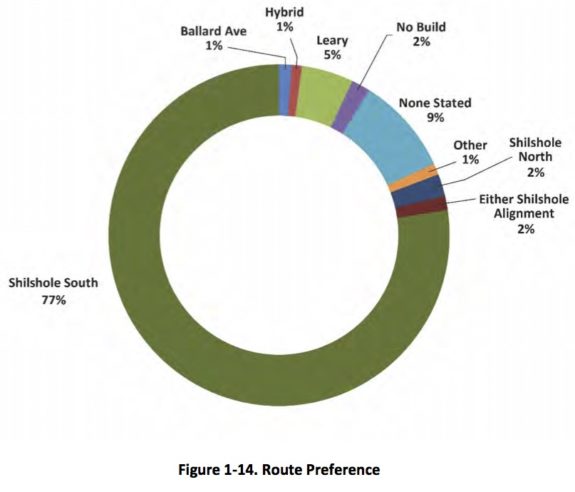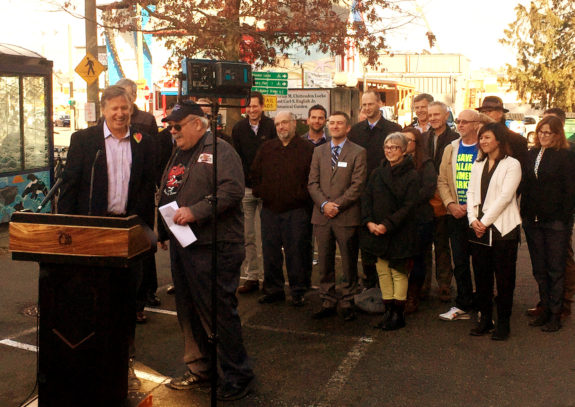Ballard Missing Link opponents appear panicked over bill to stop their endless SEPA obstruction + Why a state exemption is appropriate
 A poem posted in the window of the Ballard Landmark.
A poem posted in the window of the Ballard Landmark.Washington legislators must be doing something right because the Missing Link obstructionists seemed a bit panicked during a public hearing on HB 1814 in front of the Senate Environment, Energy and Technology Committee Friday (watch via TVW starting at 20:00 and 1:05:00).
The hearing itself didn't add anything to the Missing Link debate because that debate has been exhausted for at least a decade. There are no new arguments to be had. This was perhaps best illustrated by the hearing's sign-in website in which 1,381 people signed in pro (68%) and 648 people signed in con (32%). Zero people signed in other."
Ultimately, the Senate committee was not interested in making the decision about where to place the trail, with members and the House bill sponsor Joe Fitzgibbon making it clear that such a decision lies with the city not the state. However, SEPA obstruction also should not be allowed to artificially restrain the city's choices, especially for a trail that has been studied so exhaustively for decades.
The goal of the bill is to say, let's not have the environmental review process, which has been quite thorough in this corridor, serve as a further cause of delay in making that decision and completing those facilities," said Rep. Fitzgibbon at the start of the hearing.
Several opponents who gave testimony tried to argue that the city had resolved the issue by deciding to route the trail along Leary and Market, but that is disingenuous. The Leary/Market trail project only exists as a response to frustrations over the endless legal morass that has continued to stall out the Shilshole route. If the city had received their construction permit, they would have already constructed the trail on Shilshole years ago. Trail supporters have been clear all along that Shilshole remains the preferred route. Even public outreach specifically for the Leary/Market route showed overwhelming support for Shilshole instead.
We've also written on this site that the Leary/Market designs shown so far are inadequate, and part of the problem is that the city's is trying to design a multi-use trail in a place where a protected bike lane is more appropriate. If city engineers were freed from having to force the project to be a trail, they could create better street designs on Leary and Market that better separate walking and biking spaces, a common request during public feedback. As Cascade Bicycle Club and Washington Bikes Executive Director Lee Lambert put it during his testimony Friday, the city could consider building both of them. All dangerous streets should be made safer.
 A summary of a huge amount of public outreach conducted as part of the city's Final Environmental Impact Statement on the Missing Link project found overwhelming public support for a trail on Shilshole.
A summary of a huge amount of public outreach conducted as part of the city's Final Environmental Impact Statement on the Missing Link project found overwhelming public support for a trail on Shilshole.As shown by the hearing sign-ins as well as several different public outreach efforts throughout the endless series of Missing Link studies, people have heard all the arguments and favor building a trail on Shilshole. Public opinion has been consistent on this point. The eagerness to accept a lesser route comes from a desire to stop or at least slow the injuries to people trying to bike to and through Ballard after the abrupt end of the trail near the Ballard Bridge.
Between 2015 and 2020, there were 39 separate incidents that were serious enough that they required emergency response," said Rep. Fitzgibbon. We know there were many other bike accidents in that corridor that were less serious, didn't require emergency response, but just in 2022, there was an accident where the bicyclist who was a former chair of the Department of Architecture at the University of Washington suffered a traumatic brain injury and later lost his life due to that accident."
It's embarrassing that the city has not yet been able to win these SEPA court cases. After appellants were able in 2010-12 to successfully challenge the city's initial determination that the 1.4-mile trail on city-owned land would have no significant environment impact, the city bit the bullet and funded a massive multi-year environmental study released first in 2016 that more than answers any reasonable question a person could have about this little trail section. Trail opponents then joined a community trail design process and worked with SDOT and trail supporters to create a compromise design. Trail supporters and opponents embraced and smiled together during a lovely press event announcing an amicable end to the horrible Missing Link saga.
 Former Councilmember Mike O'Brien, a longtime trail supporter, and Warren Aakervik, the retired owner of Ballard Oil, shook hands during a 2017 press conference announcing a compromise deal. Eugene Wasserman, who testified Friday against HB 1814, is in the front row. Within months of this photo, Wasserman signed onto yet another lawsuit.
Former Councilmember Mike O'Brien, a longtime trail supporter, and Warren Aakervik, the retired owner of Ballard Oil, shook hands during a 2017 press conference announcing a compromise deal. Eugene Wasserman, who testified Friday against HB 1814, is in the front row. Within months of this photo, Wasserman signed onto yet another lawsuit.Psych! After all that time and energy working on a compromise, a group of opponents went back on their word and sued anyway. I guess trail supporters were fools for ever trusting them, a mistake that nobody should repeat. Their word no longer bears any weight. Appellants have since spent most of a decade picking the environmental megastudy apart and finding technicalities they can use to declare it insufficient. The city even burned a year or so conducting an entire additional economic analysis (complete with yet another public outreach process), but then the opponents won a shocking decision on a Hail Mary motion accusing the Seattle Hearing Examiner of being biased several years earlier, a decision that would require restarting the entire EIS court approval process. In 2021 amid all the pandemic struggles, going through an entirely new EIS approval process for the trail was not the city's top priority, so they decided to try an easier option and stripped the project down to be lower-budget and small enough that it should no longer even fall under SEPA, and that's what the latest court decisions stopping construction have been about. The ongoing appeal is about whether the Coalition of trail opponents have legal standing to make these SEPA appeals in the first place. It has been at least six years since any of these court cases have had anything to do with the trail the city wants to build. It's all been a bunch of aimless legal machinations when out on the street every day there are people whose actual lives and health are at risk just because they are trying to get around Ballard on a bike.
HB 1814 should not need to exist. This is, unfortunately, a special case in which an important environmental law designed for very large projects simply does not fit such a small trail project. The SEPA delays here are so far beyond normal that it is appropriate for the legislature to step in and say, Enough is enough." There is nothing left to gain or learn from the SEPA process at this point, but people biking on the dangerous and unimproved Shilshole Ave have everything to lose.